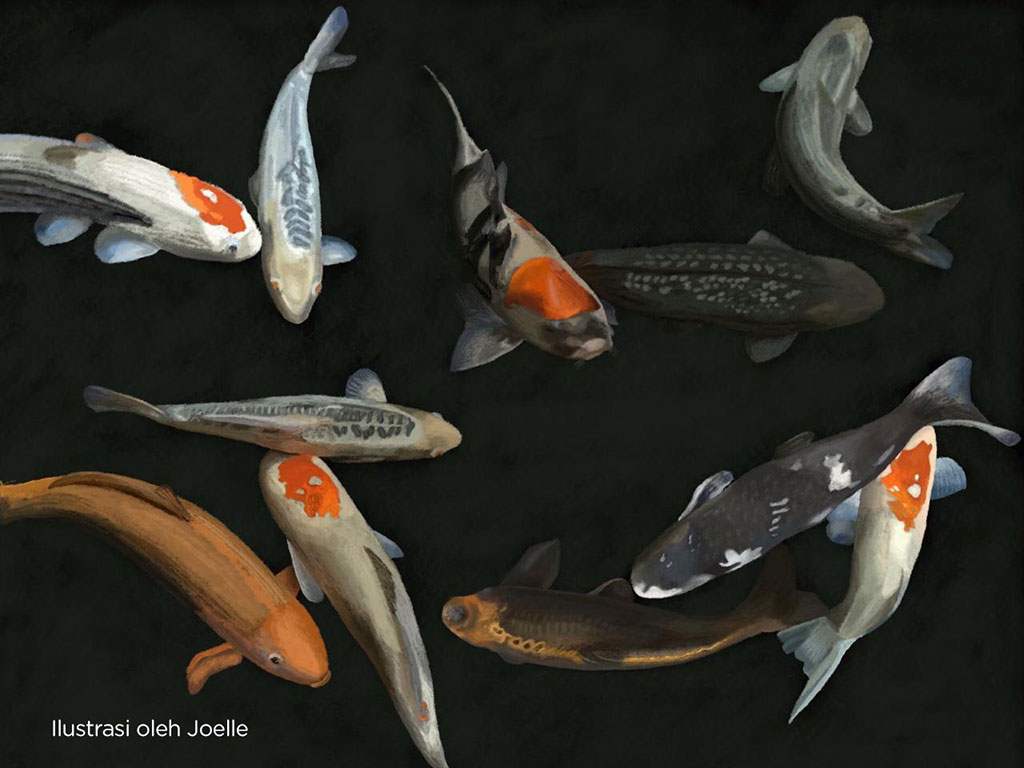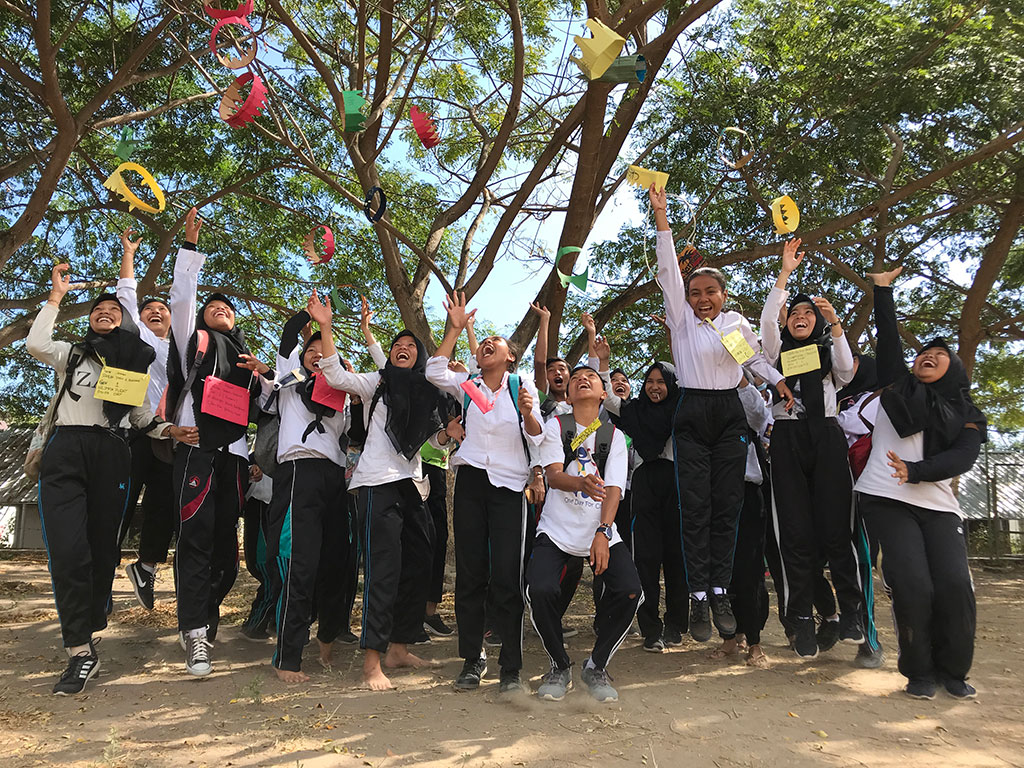
We are the average of the five people we are with frequently. I always try to remember this quote from motivational speaker Jim Rohn. It makes sense. One of the people I often bother to talk to is my best friend, Mrs. Lily Kasoem.
Mrs. Lily Kasoem is the founder of the well-known optical company Lily Kasoem. After retiring from the world of business, she dedicates her time and energy to Titian Foundation, a foundation that she founded to provide access to education for high school students who come from underprivileged families.
Access to education is provided through a scholarship program and access to Titian Centres in several poverty pockets in Indonesia. All of this was made possible thanks to the generosity of Titian’s donors from within and outside Indonesia.
One of the valuable lessons from Ibu Lily, who is fulfilled by experience in fighting poverty, is her unique perspective on poverty. For Mrs. Lily, poverty is a choice. The default is not being poor, it’s being rich. Huh… what does this mean?
This is my interpretation. People like Mrs. Lily don’t want to get focused on reactions to problems. Her focus is on preventing problems. In pre-prosperous villages, the problem that is meant to be resolved is to break the cycle of poverty. Reactive methods such as distributing groceries at harvest failures; although very noble, are not a long-term solution. It gives the fish, not the hook.

A more preventive and sustainable way is to change the mindset of the children in the pre-prosperous village. You do this by providing coaching and mentoring aside from scholarships to continue studying at school. Emphasize to them the importance of education, career, and how realistic social mobility is. And that being poor is an option. It’s not the default setting nor appropriate. The cycle of poverty could be ended only by this change of mindset. Give a hook, not a fish.
“Let’s live with the mindset of abundance and love. God has blessed everyone with intelligence. It is just that not everyone is aware of this gift and thus not able to benefit from it. Therefore, education helps.”
– Lily Kasoem
Quoting psychologists Eldar Shafir and Sendhil Mullainathan in their book ‘Scarcity’, that when people face many problems at once, people will give up trying to solve all problems. What will be done is to adopt tunnel vision, which means that there is no long-term vision. There is no priority strategy either.
Tunneling method is a way to solve the problem at hand, short-term. Being reactive to problems that are urgent to be resolved.
The problem is not the big fundamental problem that is dominant to get rid with, but the opposite. These trivial little problems in the end put the focus on big fundamental problems. The resulting solution is sub-optimum. Because of this, there are only small solutions to small problems in the end.
Likewise with poverty. Often we hear that a collection of bad decisions is making our life difficult. Maybe this logic has a point. But Shafir and Mullainathan have an argument that is 180 degree opposite. That poverty is what causes decisions that are too short-term oriented.
Scarcity. It encourages us to think less strategic, unlikely to think long-term for the future. Borrowing Dan Heath’s term in his book ‘Upstream’, a situation of poverty immensely reduces cognitive power. Being close with poverty reduces one’s bandwidth.
When our resources are limited, ALL problems, no matter how small, could become a source of stress. No money as a buffer. Living from stress 1, to stress 2, etc. It’s like walking on a thin layer of ice in a frozen lake. Once you make a wrong move…
If we live in ‘tunneling’, with priority solely placed on the issues, we will not be able to think in a systematic way. We’re only able to react to “urgent” problems, to the point of forgetting very big problems that is not placed in the “urgent” area. The problem of getting out of poverty, for example.
Unfortunately, we will never run out of urgent things to get done; matters with the “urgent” label. After all, solving an urgent problem is so dashing and cool. Heroic and addictive. Who doesn’t want to be a hero?
How do I leave the tunnel? Maybe a little slowing down. Later it will be seen that many things that seem urgent are not as urgent as imagined. Not all fire are wildfires. Not all water is flooded.
We all need a safe place to think in a long-term and in a strategic way. The place that sets us free. Titian Foundation tries to provide it through several Titian Centres. Places where school-age children are not forcefully asked to help their parents to sell ice or wash clothes, but to think about their future. A place to reap hope and joy.
We often hear stories about frogs that don’t jump out even when the water in the pot is heated. We laugh without realizing that most of us are the frogs, until it’s too late. Maybe we need to set a deadline. And an alarm. In order not to become like a frog in a heated pan, deadlines give us a time limit when to jump out of the pan. Also rituals that lead to strategic and fundamental changes. Because we are our rituals.
For example, let’s say we want to start investing in stocks. What we can do is start brainstorming regularly with people with the same mindset (ritual), starting at least next week (deadline). Also to get out of tunneling, I often use simple words that can change my mindset. Words that allow us to visualize a new mindset.
For example, instead of thinking that “I am poor” and need help, we can use Mrs. Lily Kasoem’s default, “I am rich”. If the money is not there, at least we will learn how to invest and continue to grow and learn in our work or studies or business. Not complaining every day about the difficulties of living the “I’m poor” style. If we are ready, the universe will support. God will give.
The “I’m rich” mindset is a mindset that focuses on giving. If we can’t share some of our wealth, at least we can donate time to others who are in need. Only by giving can we grow, just like pool water that is constantly being changed. And only by continuing to grow can we continue to give without running out of our resources.
Being rich is not just a matter of money, but also a matter of mentality. Only people with a rich mindset can continue to give while growing.
I am rich. That’s my default thinking. Bull market and also bear market. Let’s join…
Written by Wuddy Warsono, CFA.
Bajuku beda sama kamu,
Sepatuku juga tidak sama,
Rumahku apalagi.
Bukan suatu kebetulan,
Kalau aku punya cita-cita,
Seperti juga kamu.
Aku ingin bisa terus sekolah,
Aku mau lulus jadi sarjana,
Aku mau kejar impian.
Kata orang ubah dulu mindset-mu
Kata orang punyalah mindset positif,
Kata aku, betul juga.
Di satu waktu aku jadi tahu,
Di satu tempat aku pasti bisa,
Cara berpikir serta asa mencapai cita.
Sejuta citaku bukan mimpi,
Asal terus usaha diri,
Buat Negeri tercinta bangga.
(Asmara Devi, Jakarta, 23.08.20)
This article is originally written in Indonesian language.

